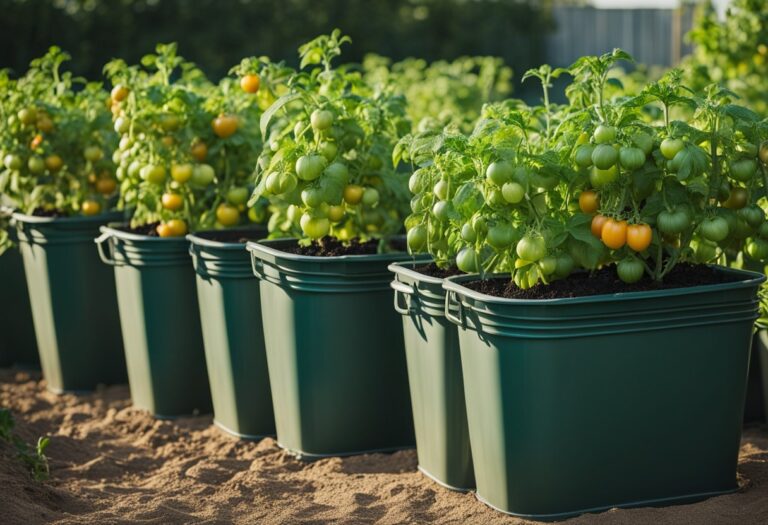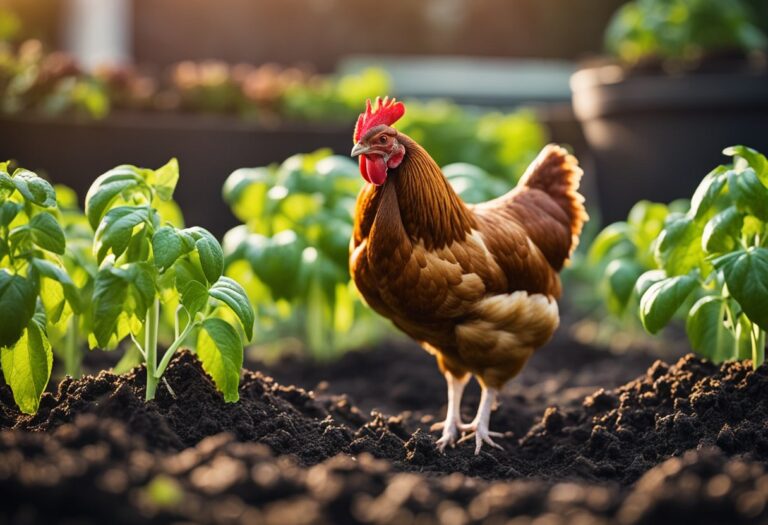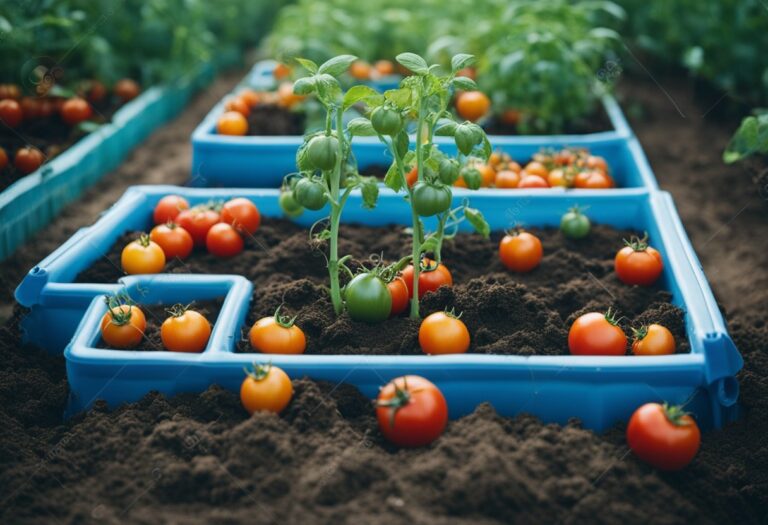Best Organic Tomato Fertilizer for a Healthy Garden
If you’re looking to grow juicy, flavorful tomatoes, then you need to start with the right fertilizer. Organic fertilizers are a great choice for tomato plants because they provide a slow release of nutrients to the soil, which can help prevent over-fertilization and nutrient burn.
Organic fertilizers also improve soil health, which can lead to healthier plants and better yields. In this article, we’ll take a look at the best organic tomato fertilizers on the market, so you can give your plants the nutrients they need to thrive.
Why Use Organic Fertilizer for Tomatoes Organic fertilizers are made from natural sources, such as plant and animal waste, and they contain a variety of nutrients that are essential for plant growth.
Unlike synthetic fertilizers, organic fertilizers release nutrients slowly over time, which can help prevent over-fertilization and nutrient burn. Organic fertilizers also improve soil health by increasing the amount of organic matter in the soil, which can help retain moisture and improve soil structure. Additionally, organic fertilizers are environmentally friendly, as they are made from renewable resources and do not contribute to soil and water pollution.
Different Types of Organic Tomato Fertilizers There are several different types of organic tomato fertilizers available, including granular, liquid, and spikes. Granular fertilizers are easy to apply and provide a slow release of nutrients to the soil. Liquid fertilizers can be applied directly to the leaves of the plant, which can help provide a quick boost of nutrients.
Spikes are a convenient option for those who don’t want to apply fertilizer as often, as they slowly release nutrients into the soil over several weeks. When choosing an organic tomato fertilizer, it’s important to consider the nutrient content and the application method to ensure that you’re providing your plants with the nutrients they need to thrive.
Key Takeaways
- Organic fertilizers are a great choice for tomato plants because they provide a slow release of nutrients to the soil and improve soil health.
- There are several different types of organic tomato fertilizers available, including granular, liquid, and spikes.
- When choosing an organic tomato fertilizer, it’s important to consider the nutrient content and the application method to ensure that you’re providing your plants with the nutrients they need to thrive.
Best Organic Tomato Fertilizer
When it comes to growing tomatoes, using the right fertilizer is key to producing a bountiful harvest.
Organic fertilizers are a great choice for those who want to avoid synthetic chemicals and promote soil health. Here are some of the best organic tomato fertilizers on the market:
1. Espoma Organic Tomato-Tone
Espoma Organic Tomato-Tone is a slow-release, granular fertilizer that is OMRI-listed for organic gardening.
It has an NPK ratio of 3-4-6, which is ideal for tomatoes. This fertilizer contains a blend of natural ingredients, including feather meal, bone meal, kelp meal, alfalfa meal, and more.
It also contains beneficial microbes that help improve soil health and promote root growth. Espoma Organic Tomato-Tone is easy to apply and provides long-lasting nutrition for your tomato plants.
2. Dr. Earth Organic 5 Tomato, Vegetable & Herb Fertilizer
Dr. Earth Organic 5 Tomato, Vegetable & Herb Fertilizer is another excellent choice for organic gardeners. This premium fertilizer contains a unique blend of natural ingredients, including fish bone meal, feather meal, alfalfa meal, kelp, and mined minerals.
It has an NPK ratio of 5-7-3, which is ideal for tomatoes. This fertilizer also contains probiotics and mycorrhizae, which help improve soil health and promote root growth.
Dr. Earth Organic 5 Tomato, Vegetable & Herb Fertilizer is easy to apply and provides long-lasting nutrition for your tomato plants.
3. Jobe’s Organics Tomato Fertilizer Spikes
Jobe’s Organics Tomato Fertilizer Spikes are a convenient and easy-to-use fertilizer option. These spikes are made with organic ingredients, including feather meal, bone meal, and sulfate of potash.
They have an NPK ratio of 2-7-4, which is ideal for tomatoes. Jobe’s Organics Tomato Fertilizer Spikes are designed to be placed in the soil around the base of your tomato plants. They slowly release nutrients over time, providing your plants with long-lasting nutrition.
4. Burpee Organic Tomato and Vegetable Granular Plant Food
Burpee Organic Tomato and Vegetable Granular Plant Food is another great option for organic gardeners. This granular fertilizer has an NPK ratio of 4-6-3, which is ideal for tomatoes. It contains a blend of natural ingredients, including feather meal, bone meal, and sulfate of potash.
This fertilizer also contains beneficial microbes that help improve soil health and promote root growth. Burpee Organic Tomato and Vegetable Granular Plant Food is easy to apply and provides long-lasting nutrition for your tomato plants.
5. Big A Tomato Fertilizer
Big A Tomato Fertilizer is an organic fertilizer that is specifically formulated for tomatoes. It has an NPK ratio of 5-3-4, which is ideal for tomatoes. This fertilizer contains a blend of natural ingredients, including feather meal, bone meal, kelp meal, and more.
It also contains beneficial microbes that help improve soil health and promote root growth. Big A Tomato Fertilizer is easy to apply and provides long-lasting nutrition for your tomato plants.
When choosing an organic tomato fertilizer, it’s important to consider the nutrient content, the ingredients, and the method of application. All of the fertilizers listed above are great options for promoting healthy tomato plants and producing a bountiful harvest.
Why Use Organic Fertilizer for Tomatoes
When it comes to growing tomatoes, using organic fertilizer has several benefits. Here are a few reasons why you should consider using organic fertilizer for your tomato plants:
1. Better Soil Health
Organic fertilizers are made from natural materials like plant and animal waste, which can improve the soil’s overall health.
These fertilizers contain beneficial microorganisms that help break down organic matter and release nutrients slowly over time. This process can improve soil structure, increase water retention, and prevent soil erosion.
2. Safer for the Environment
Organic fertilizers are safer for the environment than synthetic fertilizers. Synthetic fertilizers often contain chemicals that can harm wildlife and contaminate groundwater.
Organic fertilizers, on the other hand, are made from natural materials that won’t harm the environment.
3. More Nutritious Tomatoes
Organic fertilizers provide a wide range of nutrients that can help improve the taste and nutritional value of your tomatoes.
These fertilizers contain essential nutrients like nitrogen, phosphorus, and potassium, as well as trace minerals like calcium, magnesium, and sulfur. Using organic fertilizer can help your tomato plants produce more flavorful and nutritious fruit.
4. Cost-Effective
Organic fertilizers can be cost-effective in the long run. While synthetic fertilizers may be cheaper upfront, they often require more frequent applications and can lead to soil depletion over time.
Organic fertilizers, however, provide slow-release nutrients that can last for months, reducing the need for frequent applications.
Overall, using organic fertilizer for your tomato plants can lead to healthier soil, safer growing conditions, more nutritious tomatoes, and cost savings in the long run.
Different Types of Organic Tomato Fertilizers
When it comes to organic tomato fertilizers, there are several types to choose from. Each type has its own benefits and drawbacks, so it’s important to choose the right one for your needs. Here are some of the most common types of organic tomato fertilizers:
Granular Fertilizers
Granular fertilizers are a popular choice for many gardeners because they are easy to use and provide long-lasting results. These fertilizers come in small pellets that you can sprinkle around the base of your tomato plants.
They slowly release nutrients into the soil over time, providing your plants with a steady supply of food.
One of the best granular fertilizers for tomatoes is Espoma Organic Tomato-Tone. This slow-release fertilizer contains a balanced blend of nutrients and is made from all-natural ingredients like feather meal, bone meal, and sulfate of potash. It’s also OMRI-listed, which means it’s safe for use in organic gardening.
Liquid Fertilizers
Liquid fertilizers are another popular option for tomato growers. These fertilizers come in liquid form and can be applied directly to the soil or sprayed onto the leaves of your plants. They are fast-acting and can provide your plants with an immediate boost of nutrients.
One of the best liquid fertilizers for tomatoes is Miracle-Gro LiquaFeed Plant Food. This fertilizer is easy to use and provides your plants with a balanced blend of nutrients, including nitrogen, phosphorus, and potassium. It also contains micronutrients like iron and manganese, which are essential for healthy plant growth.
Compost
Compost is a natural fertilizer that is made from organic matter like leaves, grass clippings, and kitchen scraps. It’s a great choice for gardeners who want to improve the health of their soil and provide their plants with a steady supply of nutrients.
To use compost as a fertilizer, simply spread a layer of it around the base of your tomato plants. Over time, the compost will break down and release its nutrients into the soil.
This will help improve the structure of the soil and provide your plants with the nutrients they need to grow strong and healthy.
Fish Emulsion
Fish emulsion is a liquid fertilizer that is made from fish waste. It’s a great choice for gardeners who want to provide their plants with a high dose of nitrogen, which is essential for healthy plant growth.
To use fish emulsion as a fertilizer, simply mix it with water according to the instructions on the package. Then, apply it to the soil around the base of your tomato plants. Be careful not to apply too much, as this can burn your plants.
Bone Meal
Bone meal is a slow-release fertilizer that is made from ground-up bones. It’s a great choice for gardeners who want to provide their plants with a steady supply of phosphorus, which is essential for healthy root growth.
To use bone meal as a fertilizer, simply sprinkle a small amount around the base of your tomato plants. Be careful not to apply too much, as this can lead to nutrient burn.
How to Apply Organic Fertilizer to Your Tomato Garden
Tomatoes are heavy feeders, and providing them with the right nutrients is essential for a healthy and productive harvest. Here are some tips on how to apply organic fertilizer to your tomato garden:
1. Choose the Right Fertilizer
When it comes to organic fertilizers, there are many options to choose from, including compost, compost tea, fish emulsion, bone meal, and blood meal. Each type of fertilizer has its own unique benefits and nutrient profile, so it’s important to choose the right one for your tomato plants.
Look for a fertilizer that is high in nitrogen, phosphorus, and potassium, as these are the three key nutrients that tomatoes need to thrive.
2. Apply Fertilizer at the Right Time
Timing is everything when it comes to fertilizing your tomato plants. Applying fertilizer too early or too late can have a negative impact on your plants’ growth and yield.
For best results, apply fertilizer when your tomato plants are actively growing and producing fruit. This is usually around 3-4 weeks after transplanting or when the first flowers appear.
3. Apply Fertilizer Correctly
When applying fertilizer, it’s important to do so correctly to avoid burning your plants or causing other damage. Here are some tips on how to apply organic fertilizer to your tomato garden:
- Apply fertilizer evenly around the base of each plant, taking care not to get any on the leaves or stems.
- Mix the fertilizer into the top inch of soil using a small garden rake or cultivator.
- Water your plants immediately after applying fertilizer to help the nutrients penetrate the soil and reach the roots.
4. Consider Side-Dressing
Side-dressing is another technique you can use to provide your tomato plants with extra nutrients throughout the growing season.
To side-dress your plants, simply apply a small amount of fertilizer around the base of each plant every 4-6 weeks. This will help keep your plants healthy and productive all season long.
5. Monitor Your Plants’ Progress
After applying fertilizer, it’s important to monitor your plants’ progress to ensure they are getting the nutrients they need. Look for signs of healthy growth, such as strong stems, dark green leaves, and plenty of fruit.
If you notice any signs of nutrient deficiency, such as yellowing leaves or stunted growth, you may need to adjust your fertilization schedule or switch to a different type of fertilizer.
By following these tips, you can ensure that your tomato plants are getting the nutrients they need to grow strong and healthy. With a little bit of care and attention, you can enjoy a bountiful harvest of delicious, organic tomatoes all season long.
Frequently Asked Questions
Which organic tomato fertilizer is the most effective?
There are many effective organic tomato fertilizers available on the market. Some popular options include Dr. Earth Organic Tomato & Herb Fertilizer, Espoma Organic Tomato-tone Fertilizer, and Jobe’s Organic Vegetable & Tomato Fertilizer.
The effectiveness of a particular fertilizer depends on various factors such as soil quality, climate, and plant variety. It is recommended to do some research and choose a fertilizer that suits your specific needs.
What is the recommended NPK ratio for tomato fertilizers?
The recommended NPK ratio for tomato fertilizers is typically in the range of 5-10-10 or 8-8-8. However, it is important to note that different stages of plant growth require different ratios of nutrients.
For example, during the vegetative stage, plants require more nitrogen, while during the flowering and fruiting stage, they require more phosphorus and potassium.
It is recommended to choose a fertilizer that provides a balanced ratio of nutrients throughout the plant’s growth cycle.
Is Dr. Earth Tomato Fertilizer a good choice for organic gardening?
Dr. Earth Organic Tomato & Herb Fertilizer is a great choice for organic gardening. It is OMRI, OIM, CCOF, NOP Listed Organic, and Non-GMO Verified.
The fertilizer is made in the USA and has an NPK ratio of 4-6-3. It is formulated with a blend of fish bone meal, feather meal, kelp meal, alfalfa meal, soft rock phosphate, and mined potassium sulfate.
This unique blend provides a balanced ratio of nutrients and promotes healthy plant growth.
What are some liquid fertilizers that work well for tomatoes?
Some liquid fertilizers that work well for tomatoes include fish emulsion, seaweed extract, and compost tea.
Fish emulsion is a great source of nitrogen and can be used during the vegetative stage of plant growth. Seaweed extract is rich in micronutrients and can be used throughout the plant’s growth cycle.
Compost tea is a natural and nutrient-rich fertilizer that can be made at home using compost and water.
Can Tomato-tone fertilizer be used for other plants besides tomatoes?
Yes, Tomato-tone fertilizer can be used for other plants besides tomatoes. It is a general-purpose organic fertilizer that provides a balanced ratio of nutrients and promotes healthy plant growth. It can be used for vegetables, herbs, and flowers.
How often should I apply organic tomato fertilizer to my plants?
The frequency of application depends on the type of fertilizer and the stage of plant growth. It is recommended to follow the instructions on the fertilizer package for best results.
However, as a general rule of thumb, organic fertilizers can be applied every 4-6 weeks during the growing season. Over-fertilization can lead to nutrient burn and other problems, so it is important to apply fertilizers in moderation.



